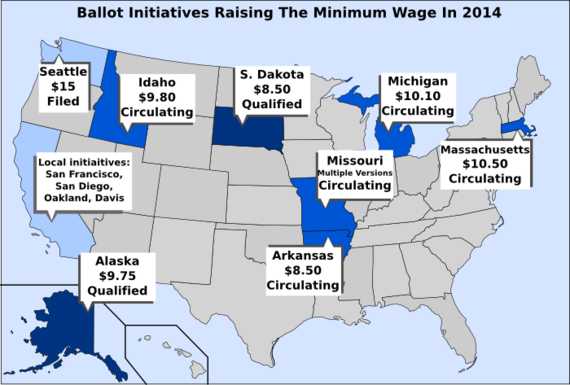Pundits and reporters all over the nation are in a rush to write a very particular story when it comes to the minimum wage. The question they keep asking is will minimum wage ballot measures help Democrats in the midterm election?
The problem with this angle is that the story ends on Election Day, when, in fact, this election provides a unique opportunity for the beginning -- not the end -- of a conversation about what makes our economy work for everyone. This is a conversation that will continue to have political reverberations for cycles to come.
As far as their story goes: The answer is yes. Based on everything we know, minimum wage ballot measures probably will help Democrats in November.
Eight years ago, the last time a group of states used ballot measures to raise the minimum wage, the Ballot Initiative Strategy Center researched how these measures affected voter turnout. We found that turnout increased among Democrats and swing voters.
More recently, research from 2013 found that ballot measures of any type are most appealing when they provide concrete ways for people to impact their communities. For low-wage workers, young people, women, communities of color and other groups holding the large majority of these jobs, raising the minimum wage is a compelling reason to show up at the polls. Candidates who oppose these initiatives risk losing the support of these voters, as well.
So reporters are correct to look for political consequences beyond the policy itself. But a narrow focus on a few specific states in a single election year misses the more important story.
Because of the widening income gap in this country, economic fairness will be an important issue for years to come. Candidates, pundits and reporters will be talking about building an economy that works for everyone in 2016, 2018, 2020 and beyond. The minimum wage increases we're seeing this year are just a jump-start to that important work.
Advocates in several cities are already moving beyond the $10-per-hour proposals and are pushing for $15 this year. BISC will be there to support that work because these proposals are vital to the millions of families trying to make ends meet.
BISC (along with some of the most strategic thinkers in our movement) is already working on other ballot issues that build on economic fairness, drive turnout and create enthusiasm for voting.
The real story is that we're just getting started. Even if the reporters we talk to can't see beyond November.
